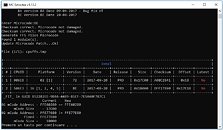Monday, March 5th 2018

Modders Get "Coffee Lake" Chips to Work Stable on Intel 100/200-series Chipsets
One of the greatest complaints enthusiasts had with Intel's 8th generation Core "Coffee Lake" processors and their companion 300-series chipsets is their lack of compatibility with older 200-series and 100-series chipset motherboards, despite sharing an identical LGA1151 socket. Tinfoil hatters attributed this to Intel's synthetic platform-gating to ensure people buy new motherboards every two CPU generations; while Intel itself maintained that "Coffee Lake" chips have special electrical requirements that come with the increased core-counts, without explaining how that shouldn't exempt quad-core SKUs such as the Core i3-8100 and the i3-8350K from functioning on older platforms.
It turns out that "Coffee Lake" is pin-compatible with older LGA1151 motherboards based on 200-series and 100-series chipsets after all, as modders got some of these chips to work on the older platforms. Intel is using software to prevent Coffee Lake from working on older motherboards. This software comes in the form of the CPU's microcode, the iGPU's UEFI GOP driver, and certain Management Engine bootstraps on the side of the motherboard BIOS that lets it recognize the new chips. With the safe transplanting of these pieces of software, Overclock.net modders rootuser123, LittleHill, dsanke, elisw, Mov AX, and 0xDEAD; succeeding in not only getting the chips to work on older platforms, but also found ways to iron out several stability and compatibility issues. They've published a guide at this page.
Source:
Overclock.net Forums
It turns out that "Coffee Lake" is pin-compatible with older LGA1151 motherboards based on 200-series and 100-series chipsets after all, as modders got some of these chips to work on the older platforms. Intel is using software to prevent Coffee Lake from working on older motherboards. This software comes in the form of the CPU's microcode, the iGPU's UEFI GOP driver, and certain Management Engine bootstraps on the side of the motherboard BIOS that lets it recognize the new chips. With the safe transplanting of these pieces of software, Overclock.net modders rootuser123, LittleHill, dsanke, elisw, Mov AX, and 0xDEAD; succeeding in not only getting the chips to work on older platforms, but also found ways to iron out several stability and compatibility issues. They've published a guide at this page.

50 Comments on Modders Get "Coffee Lake" Chips to Work Stable on Intel 100/200-series Chipsets
www.bit-tech.net/features/tech/motherboards/asus-interview-andrew-wu-rog-motherboard-pm/1/
Quoting TPU's 8700K review:Other review sites gave a similar impression, if I recall correctly.
Now tell me that the old socket couldn't handle the extra 10-20~ Watts of the 8700K
From our friends: en.wikipedia.org/wiki/Business
Or maybe, just for once, think of the customers and keep compatibility at least for the lower end of the spectrum (quad cores and below)...I so want a T-shirt now hahaha
And yes, like @Hardware Geek there was a time when I thought I was AMD for life, then Intel came out with Core and I bought into those. If I were in the market right now, I'd look at offers from both sides.
As for Intel’s reasons, I wonder if this is also to appease other players in the industry. OEMs wouldn’t want it it be that easy for a customer to add that much more performance to an existing system. The PC market is already hurting enough, right?
People forget history, Intel on the other hand has learned from their mistakes.
Simple stuff folks: quit whining. If you don't like the product don't buy it. If you don't want a new motherboard to go with your new processor from Intel keep what you have or buy AMD. AMD will gladly offer you a lower performing chip at a lower price. Whatever Intel is doing works - their stock is just off a 5 year high and motherboard mfg are able to make motherboards because they are actually in business.
Where Intel is taunting us is their needing to (presumably) adjust current/voltage, yet keeping the same socket layout. That's a big no-no and they have little reason for doing it. Let them catch flak now, lest they do it again in the future.
Which stability tests exactly and for how long ... dunno.
That said, your question is pertinent (underlined): Even if it ends up passing ... say ... 48 hours of prime95 (exaggerating to make a point) doesn't mean it "lasts" as much as it would in a motherboard made for the processor(s) in question.
As for the rest of your rant, enjoy your Intel inside :rolleyes: